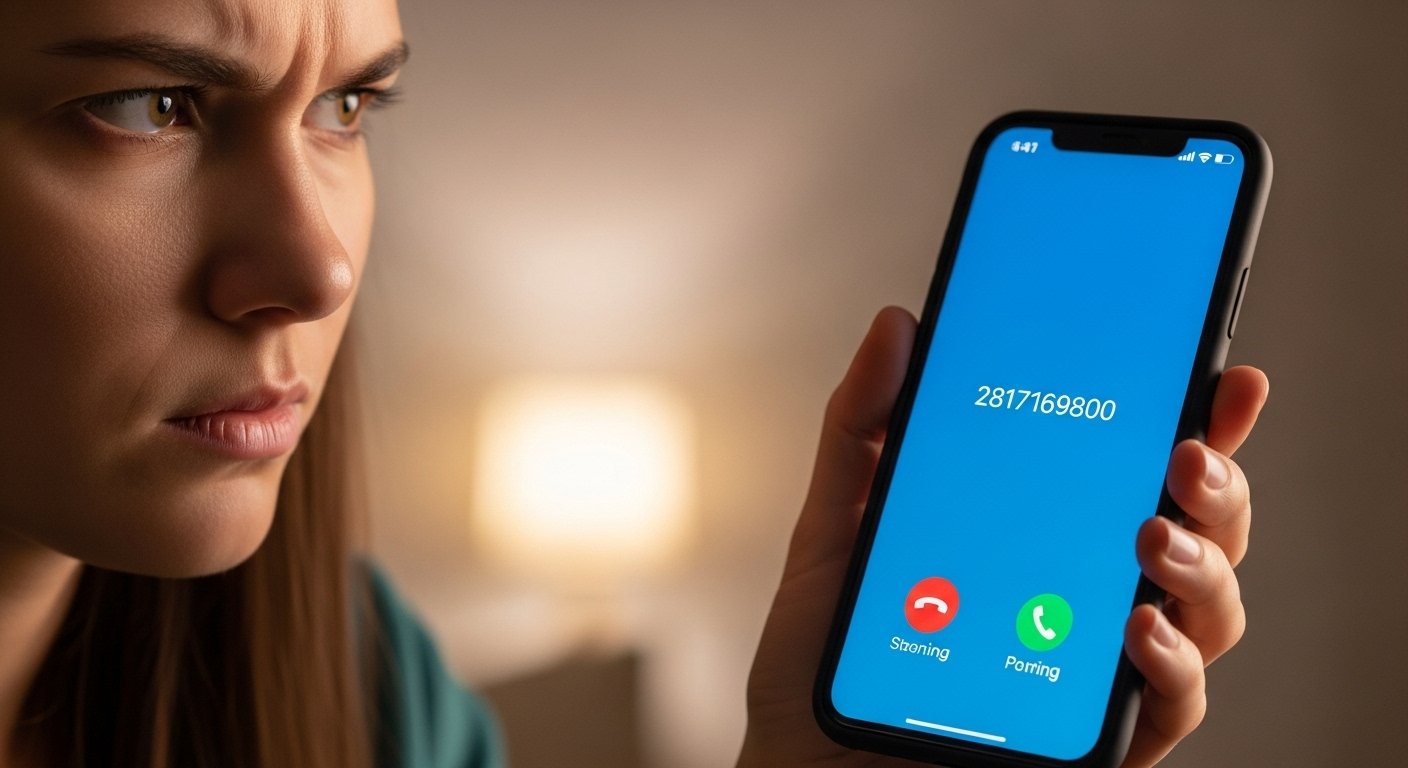Have you ever been going about your day when your phone rings, displaying a number you don’t recognize? It’s a common experience in our connected world. One such number that has been popping up on countless caller IDs is 2817169800. If you’ve found yourself staring at this string of digits, feeling a mix of curiosity and caution, you’re not alone.
Who is calling from this number? Is it a legitimate business, a persistent telemarketer, or something more sinister like a scam? Understanding the source of these calls is the first step to taking back control of your privacy and peace of mind. This article dives deep into the world of 2817169800, exploring its origins, the reports from people who have answered, and the essential strategies you can use to protect yourself from unwanted calls. Let’s demystify this number together.
What is 2817169800? Breaking Down the Digits
Before we jump into who might be calling, let’s break down the number itself. This isn’t just a random sequence; it follows the standard North American Numbering Plan (NANP).
The area code 281 provides our first major clue. This area code is not a fictional one from a TV show; it’s a very real geographic identifier. It primarily serves a large part of southeastern Texas, specifically covering suburbs of Houston and surrounding areas like Sugar Land, Baytown, and Pasadena. Knowing the location helps us narrow down the potential origins of the call.
The remaining digits, 7169800, form the central office code and line number, pinpointing a more specific location or service within the 281 area code. While individuals can have numbers in this format, the high volume of reports suggests this is more likely a business number or, more concerningly, a number used for mass calling campaigns.
Who is Really Calling from 2817169800?
Based on a vast number of user reports and complaints logged on call-blocking apps and websites, a clear picture begins to emerge. The entity behind 2817169800 is most frequently identified as a persistent telemarketing operation.
The calls are often automated, meaning a robocall or pre-recorded message initiates the conversation. This is a classic tactic used to reach a massive number of people with minimal effort. The content of these calls tends to fall into a few predictable categories.
Common Robocall Scripts and Ploys
When people answer a call from 2817169800, they are typically met with one of several scenarios. Recognizing these patterns is key to avoiding a scam.
The Vehicle Warranty Scam
This is one of the most notorious and widespread robocall themes. The automated message will urgently inform you that your car’s warranty is about to expire. It will press you to “press 1 to speak with a representative” or “call back to avoid immediate suspension of your coverage.” The goal is to trick you into either providing personal information or paying for a worthless extended warranty plan for a vehicle you may not even own anymore.
The Debt Consolidation Offer
Another common script involves offers for debt relief or consolidation loans. The recording might claim you are pre-approved for a loan with incredibly low interest rates, designed to help you pay off credit cards or other debts. These are often bait-and-switch tactics, where the final terms are far less favorable, or they are outright phishing attempts to get your social security number and banking details.
The “Hi, I’m calling for…” Silent Call
A frustratingly common experience is answering the call only to be met with a brief silence, followed by a disconnect. Sometimes, you might hear a faint background noise of a call center. This is often a sign of an automated dialer that has called more numbers than its available agents can handle. Your number has been confirmed as “active,” which can lead to even more spam calls in the future.
Is 2817169800 a Dangerous Scam?
This is the critical question. While not every unsolicited call is malicious, the patterns associated with 2817169800 raise significant red flags.
The use of robocalling alone is a strong indicator of a operation that does not have your best interests at heart. Legitimate businesses typically have more professional and direct contact methods. Furthermore, the themes of the calls—fake warranties and too-good-to-be-true loans—are hallmarks of known financial scams.
The primary dangers here are:
-
Phishing for Personal Information: The callers may try to extract your full name, address, date of birth, or even your social security number.
-
Financial Fraud: The ultimate goal is often to trick you into making a payment via wire transfer, gift cards, or a fraudulent online portal.
-
Confirming an Active Number: Even if you just answer and hang up, you’ve signaled that your number is active, making it a more valuable target for sale to other spammers.
Given these factors, it is safest to treat any unsolicited call from 2817169800 with extreme suspicion and assume it has malicious intent.
How to Protect Yourself from Unwanted Calls
You don’t have to sit back and accept these nuisance calls. There are several proactive steps you can take to shield yourself and reduce interruptions.
Immediate Actions: What to Do When 2817169800 Calls
Your first instinct might be to answer and demand to be taken off their list, but this is often the worst thing you can do. Here’s a better strategy:
-
Don’t Answer: The most powerful tool you have is silence. If you don’t recognize the number, let it go to voicemail. A legitimate caller will leave a message. A robocaller typically will not, or it will leave a suspicious-sounding automated message.
-
Never Engage or Press Buttons: If you do answer by mistake, do not follow the instructions to “press 1 to speak to an agent” or “press 9 to be removed from our list.” This only confirms your number is active and that there is a person on the other end, making you a prime target for future scams.
-
Hang Up Immediately: Do not provide any information, not even a “yes” or “no.” Scammers can record your voice and use it for authentication on other accounts. Simply hang up.
Long-Term Defense Strategies
For a more permanent solution, consider these methods:
Utilize Built-in Smartphone Features
Both iPhones and Android devices have robust features to silence or block unknown callers.
-
iPhone: Go to Settings > Phone > Silence Unknown Callers. This sends all calls from numbers not in your contacts, mail, or messages straight to voicemail.
-
Android: Open the Phone app, tap the three dots > Settings > Blocked numbers, and toggle on Block unknown callers.
Register with the National Do Not Call Registry
While scammers often ignore it, registering your number at DoNotCall.gov is a good first step. It legally requires legitimate telemarketers to stop calling you. It may not stop 2817169800, but it will reduce other marketing calls.
Use a Third-Party Call-Blocking App
Consider investing in a reputable call-blocking application. Services like Nomorobo, Hiya, or Truecaller use massive community-based databases of reported numbers to identify and block spam calls before they ever reach your phone. They are often very effective at identifying numbers like 2817169800.
What If You’ve Already Engaged with the Caller?
If you’ve already interacted with someone from 2817169800 and are concerned, don’t panic. Take these steps to secure your information:
-
Monitor Your Accounts: Keep a close eye on your bank and credit card statements for any unauthorized transactions.
-
Place a Fraud Alert: If you provided personal details like your Social Security number, contact one of the three major credit bureaus (Equifax, Experian, or TransUnion) to place a fraud alert on your credit file.
-
Change Passwords: If any login information was compromised, change those passwords immediately.
-
Report the Number: File a complaint with the Federal Trade Commission (FTC) at ReportFraud.ftc.gov. This helps government agencies track and take action against these illegal operations.
Conclusion: Knowledge is Your Best Defense
The mystery of 2817169800 is, unfortunately, a common one in the modern age. It represents a persistent, likely fraudulent telemarketing campaign originating from the Houston, Texas area. The calls are designed to create a sense of urgency or offer a solution to a problem you may not even have, all with the goal of separating you from your money or personal data.
The key takeaway is that you are in control. By refusing to answer, never engaging, and using the powerful blocking tools at your disposal, you can significantly reduce the power these scammers have. Share this knowledge with friends and family, especially those who may be more vulnerable to such tactics. Together, we can hang up on scams for good.
Frequently Asked Questions (FAQs) About 2817169800
1. Is 2817169800 a legitimate number?
While the number itself is a valid, assigned number from the 281 area code (Texas), it is overwhelmingly reported as a source of illegal robocalls and telemarketing scams. It is not associated with any known, reputable business.
2. What should I do if I accidentally gave them information?
If you provided financial information, contact your bank or credit card company immediately to report potential fraud. If you gave out personal details like your SSN, place a fraud alert with the credit bureaus and monitor your credit reports closely.
3. Can I block the 2817169800 number?
Absolutely. You can manually block the number through your phone’s settings. For a more comprehensive solution, enable “Silence Unknown Callers” (iPhone) or “Block Unknown Callers” (Android), or use a dedicated call-blocking app that will automatically block numbers with a bad reputation.
4. Why do I keep getting calls from numbers similar to my own?
This is a tactic called “neighbor spoofing.” Scammers use software to fake their caller ID to display a number with your same area code and prefix, making it seem like a local call. This increases the likelihood you will answer. The call from 2817169800 could be spoofed, meaning the real caller is hiding behind that number.
5. Will answering the call once lead to more spam calls?
Yes, it very likely will. Answering a robocall, even if you hang up immediately, signals to the scammer’s system that your number is active and answered by a human. This makes your number more valuable, and it is often sold to other spammers, leading to a sharp increase in unwanted calls.

